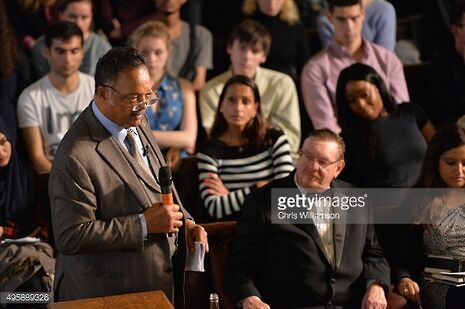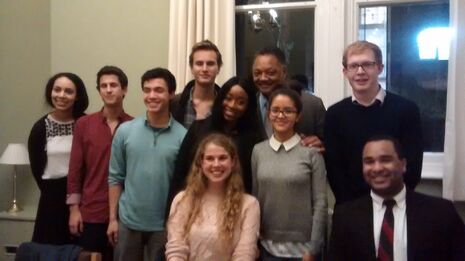Jesse Jackson: “Change always comes from the people”
Louis Ashworth talks to the prominent civil rights campaigner after his appearance at the Union debate on Thursday

Jesse Jackson almost needs no introduction. For fifty years he has been at the forefront of the civil rights movement in the United States, and has campaigned tirelessly on issues of justice and representation. On Thursday night, the South Carolina-born politician, prominent activist and Baptist preacher came to Cambridge to participate in a debate on racism at the Cambridge Union, and gave an interview with Varsity.
Jackson worked for Dr Martin Luther King Jr., participated in the Selma to Montgomery marches and was a candidate for the Democratic presidential nomination in 1984 and 1988. He came to debate at the Union on the motion of “This House believes the American dream is colour blind”. Jackson led the opposition.
The Union debate took place during the 50th anniversary year of the debate between James Baldwin and William F. Buckley on the topic “This house believes the American dream has been at the expense of the American negro”. A video of Baldwin’s famous speech played as the speakers takes their seats.
As Jackson entered, there was a loud and sustained round of applause, and the other speakers paid tribute to his notable legacy and life in their speeches. The debate was civil but highly active, drawing a number of impassioned speeches on both sides and from the floor. Throughout the debate, Jackson frequently made points of information, and replied at length to the speeches made by others. After an African-American student – from Brooklyn, New York – gave a powerful speech, he reached back, and held her hand for a moment. When he spoke, he emphasised the issues he holds with the idea of ‘colour-blindness’.
“Colour blindness seeks another course,” he said. “It seeks to ignore”.
“To seek to be colour blind is unnatural, a mental illness. Colour blindness is an ideology, another form of racism.”
At times, his speech was hard to understand – his distinct, familiar accent swallowing occasional words, and varied volume levels sometimes forcing those on the balcony to lean forwards to hear him. What remained clear, nonetheless, were his arguments.
He described those African-Americans who have succeeded as “flowers in the cement cracks”.
“The most fortunate, the most gifted amongst us have made it somehow, someway.”
Every time he sat down, he did so to rapturous applause, and, when the time came to vote, Jackson and the Opposition scored a resounding victory.
After the debate, the press gathered in one of the smaller rooms of the Union. It took a long time for Jackson to make it to us – as he travelled down the corridor, he often stopped to talk to people, and shake their hands. When he entered, it was without his minders – instead, he was accompanied only by Lyle “Butch” Wing, and the student from Brooklyn. Butch Wing is the Executive Director of the Silicon Valley project branch of Jackson’s social justice coalition Rainbow PUSH.
He sat across the table from the gathered reporters and, before any questions were asked, began to speak about the work Rainbow PUSH been doing in Silicon Valley, to increase diversity and representation.
“The structural gaps are getting wider in healthcare, infant mortality, life expectancy and lack of access to capital.”
In particular, he focuses upon the lack of diversity at Twitter. As he spoke, he occasionally stopped, and checked with Butch that he was getting facts correct. He laced his speech with stats and figures, bemoaning the lack of African-American representation on the boards of major tech firms. He was asked about his two presidential runs.
“It was exciting and it was a breakthrough, it was a challenge to the old order…we changed the rules.”
Jackson has been outspoken on the issue of gun control, and has been a spokesperson for the African-American community during the recent wave of highly publicised police shootings.
“The rising conscience among the people is to change the paradigm. Change always comes from the people, not from top-down. The big change has been cameras, not candidates.”
Speaking to Varsity, he discussed former neuroscientist Ben Carson, an African-American, who has recently overtaken Trump in polling for the Republican nomination. Carson and Jackson have clashed before on Fox News – the former contesting Jackson’s description of police brutality against blacks. Yet, when asked whether he thought Carson would be a good representative for African-Americans, he seemed hesitant to condemn.
“That’s not what he’s running for. He’s running, embracing the Republican ideology, and he’s doing that very well. He is a brilliant physician, I identify with his medical work more than I do his politics, but that’s all right. He has positions he believes in, fundamental positions. That there’s quite a significant [number of whites] who affirm him and not reject him by race is a good thing.”

Jackson’s words were drenched in the experience of history. During the interview, as he did in the debating chamber, he often listed major events in the civil rights movement – noting the progress that has been made, but relentless in his focus on the battles still to be fought. At 74, he could be forgiven for retiring from a public life that was born in the segregated Southern States, and reached its symbolic apex at the appointment of Barack Obama. Yet he shows no signs of slowing down. As he spoke, Butch, who perched behind Jackson, occasionally took photographs.
Asked about the recent criticism that presidential nomination candidate Bernie Sanders has received, he was complimentary about his fellow Democrat. Sanders, who nominated Jackson during his Presidential runs, has come under fire for not highlighting issues of race and social justice enough during his campaign.
“It’s a weakness in his campaign, but it’s not fair. Bernie is a very decent guy. He’s come from the whitest state in the country, his basic body relationships are not black.”
“He’s become a strong moral voice, a good campaigner, but [Hillary Clinton] has got the inside track at the moment, because of time spent and money.”
“Hillary certainly has the most press and the most relationships.”
As we reached the end of the interview, Jackson offered the reporters a joint photo. There was a feeling of great relief in the room – none could deny how much they wanted it. Phones were set out, cameras open, and a group was formed. Butch ran through the devices, quickly taking a photo on each. Jackson said thank you, and farewell, and headed out into the corridor. Afterwards, there was a strange atmosphere in the room, as everyone acknowledged the titanic stature of the man we had just met.
 News / Judge Business School advisor resigns over Epstein and Andrew links18 February 2026
News / Judge Business School advisor resigns over Epstein and Andrew links18 February 2026 News / Hundreds of Cambridge academics demand vote on fate of vet course20 February 2026
News / Hundreds of Cambridge academics demand vote on fate of vet course20 February 2026 News / Gov grants £36m to Cambridge supercomputer17 February 2026
News / Gov grants £36m to Cambridge supercomputer17 February 2026 News / CUCA members attend Reform rally in London20 February 2026
News / CUCA members attend Reform rally in London20 February 2026 News / Petition demands University reverse decision on vegan menu20 February 2026
News / Petition demands University reverse decision on vegan menu20 February 2026










